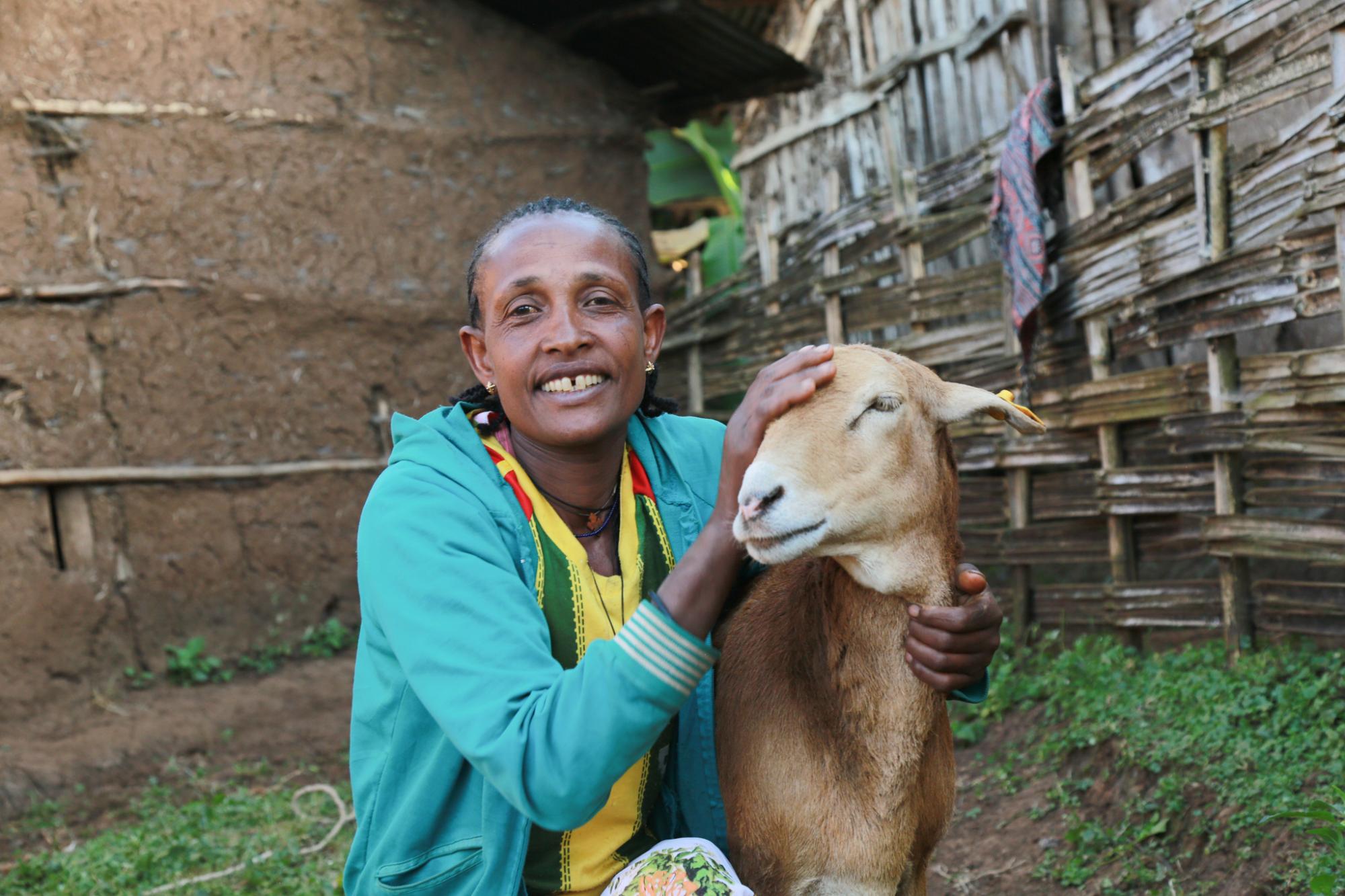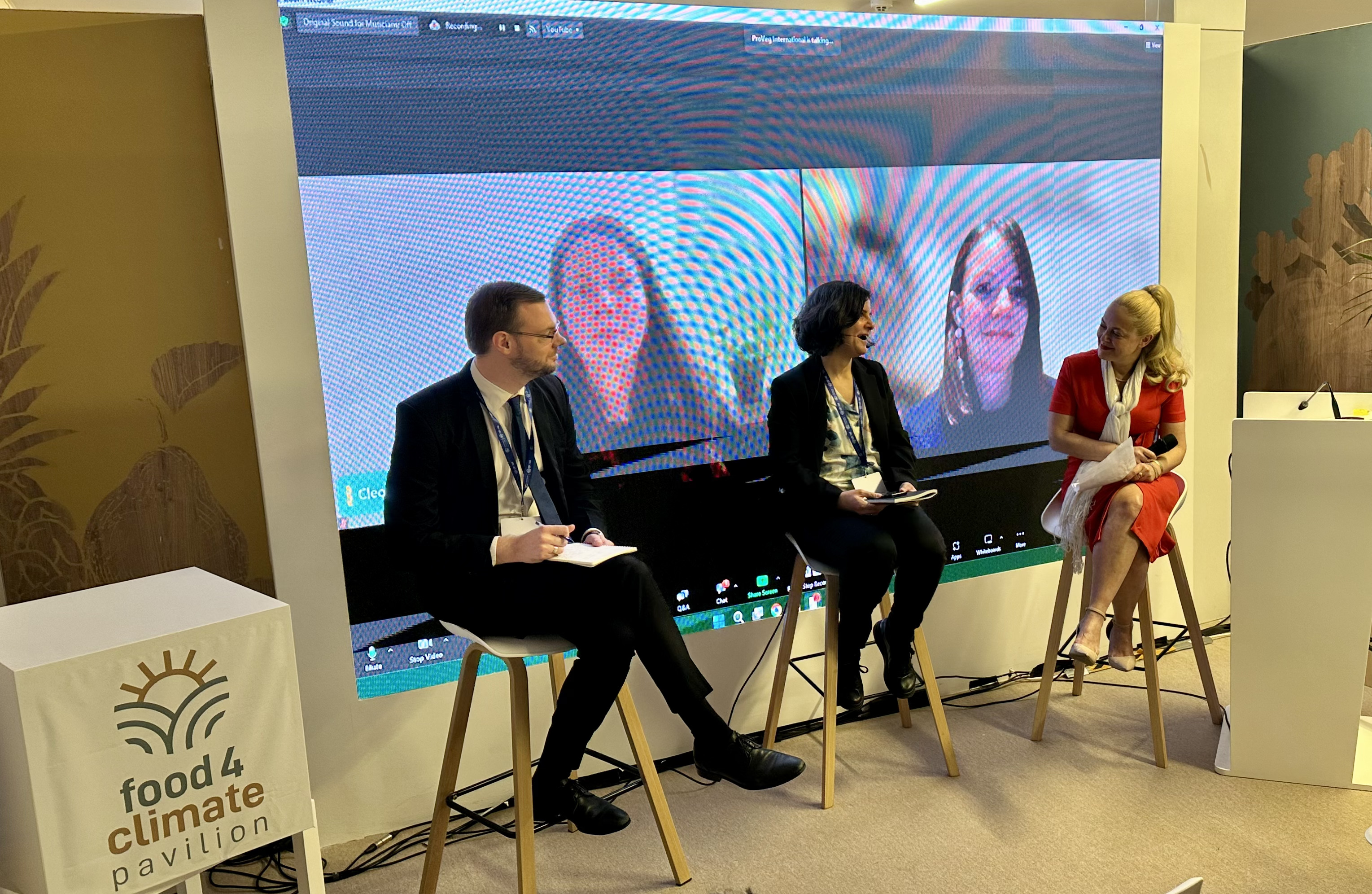
The intersection of animal welfare, climate change and One Health – 11 Dec
Core message
Event summary
This session held at the Food4Climate pavilion at COP28, hosted by Four Paws and the World Federation for Animals, featured a keynote speech by eminent expert in animal welfare, Cleo Verkuji of the Stockholm Environment Institute, followed by a panel discussion on climate action and One Health with specialists from the International Livestock Research Institute, the UN World Health Organization and the Sylcan Trust . The focus was on the critical intersection of sustainable food systems, animal welfare and their collective impact on our planet and well-being.
The debates surrounding climate change have traditionally focused on the impact of fossil fuels. Recently, this dialogue has evolved to encompass agricultural emissions, particularly their role in the transformation of food systems, with a specific emphasis on livestock. This evolving narrative reached a significant milestone at the latest UN climate change conference with the release of the COP28 UAE Declaration on climate and health, marking a shift towards inclusion of health considerations in the climate discourse and underlining the interconnectedness of our environment, food systems and health.
In this broader context of climate change, however, animal welfare remains a critical yet overlooked element. Cleo Verkuji of the Stockholm Environment Institute (SEI) points out this significant omission: ‘In the last 30 years, animal welfare hasn't been mentioned in any major climate change reports – from IPCC documents to the UAE declaration.’
In the session, Verkuji highlighted the need to acknowledge how animal welfare principles are intertwined with the linkages between climate and health. There are an estimated 80 billion livestock animals on our planet, she said, each described as a 'living, sentient being'. In the pursuit of transforming agriculture under a just transition framework, the inclusion of these animals' well-being is not just relevant, but necessary.
The relationship between human lives and the animals we raise for food is multi-faceted. Verkuji, in an article she co-authored before COP28, notes that over 70% of antimicrobial use occurs in animals, contributing to the rise in human resistance to life-saving bacteria-fighting medicines. Furthermore, 75% of new or emerging infectious diseases are zoonotic, meaning that they originate from animals – examples include diseases like COVID and avian influenza. The way we manage the health of animals and their living conditions, therefore, plays a significant role in controlling these risks.
In addressing these challenges, it's important to consider the context and perspectives of smallholder farmers, particularly in lower and middle-income countries, as emphasized by animal welfare scientist Rebecca Doyle from the International Livestock Research Institute (ILRI) and the University of Edinburgh.
Doyle pointed out that in many smallholder production systems, adopting good animal welfare practices not only enhances livelihoods and environmental outcomes, it also contributes to better health management. For instance, practices like effective manure management, where manure is used for fertilizer or biogas, help mitigate disease risks by ensuring that manure is cleaned out from livestock shelters. Conversely, intensifying production or restricting animal movement can lead to negative welfare outcomes, underscoring the need for a balanced and inclusive approach in policy and practice.

Key takeaways
- Navigating the triple planetary crisis of climate, health and biodiversity requires an understanding that these crises are interconnected and not occurring in isolation. Adopting an integrated approach like the One Health framework are essential to tackling the root causes of these interlinked issues.
‘Human activity is endangering the lives of 1 million land animal species and two-thirds of aquatic resources. About half of our terrestrial space has been altered, mostly because of agriculture. All of these are contributing to our dysfunctional food systems.’ – Christina Romanelli, UN World Health Organization
- Improvements in animal welfare in livestock production can lead to a reduction in mortality, increased productivity and better outcomes for families in low- and middle-income countries. Moreover, addressing challenges like access to veterinary services and quality feed, alongside integrating perspectives from smallholder farmers, can contribute to developing sustainable and equitable food systems.
‘A transdisciplinary approach in discussions around health and climate is essential. We also need to look at the social, cultural implications and individual interactions that have an impact on livestock production, specifically animal welfare, in low- and middle-income countries.’ – Rebecca Doyle, ILRI/University of Edinburgh
- More animal welfare impact assessments are needed. Results from these can guide financing decisions that integrate animal welfare into economic and environmental planning. Equally important is funding interdisciplinary research on emissions reduction, considering both public and animal health impacts.
What panelists had to say
‘Animal welfare is an important two-way relationship for farmers. Their lives depend on their animals, and the lives of their animals depend on them.’ – Rebecca Doyle, ILRI/University of Edinburgh
--
‘All living beings are inextricably linked; human health and environmental ecosystem health bring in all components of biodiversity. We exist within complex systems, yet often resort to simplistic, reductionist thinking. While systems thinking doesn’t traditionally factor into policies, we are starting to see a shift. WHO Director General Tedros has increasingly emphasized that acting on climate is inherently acting on human health. It took 28 COPs to finally bring health into the climate agenda, a step that was long overdue.’ – Christina Romanelli, WHO
--
‘The recent publication of FAO’s global roadmap to achieving SDG2 without breaching the 1.5 degree threshold is where we miss the opportunity to consider animal welfare. Mitigation of emissions in animal production systems is listed as a priority, but does not acknowledge the potential cost to the wellbeing of animals. Business as usual is not possible anymore, we need to be more disruptive.’ – Cleo Verkuji, Stockholm Environment Institute
--
‘Climate change is not simply an environmental crisis – it’s a socio-economic human challenge. Ambition and holistic synergies are important to tackle this, looking at the solutions that people are implementing and thinking how to make vertical and horizontal connections.’ – Dennis Mombauer, Sylcan Trust
Useful links
- Climate action, livelihoods and food security: why animal welfare is the missing link: https://www.sei.org/perspectives/will-animal-welfare-be-cop28s-sacrificial-lamb/
- Achieving SDG2 without breaching the 1.5C threshold: A Global Roadmap: This report outlines various actions and milestones to transform food production in response to threats from the climate crisis and chronic hunger while limiting the global temperature rise to 1.5C (2.7F) as outlined in the 2015 Paris Agreement.
- The guide to implementing the One Health Joint Plan of Action at national level: The Guide is an operational addendum to the 2022 One Health Joint Plan of Action, signaling a strategic objective to country-focused implementation. The guide outlines three pathways – governance, sectoral integration, and evidence and knowledge – and five steps to achieve One Health implementation.